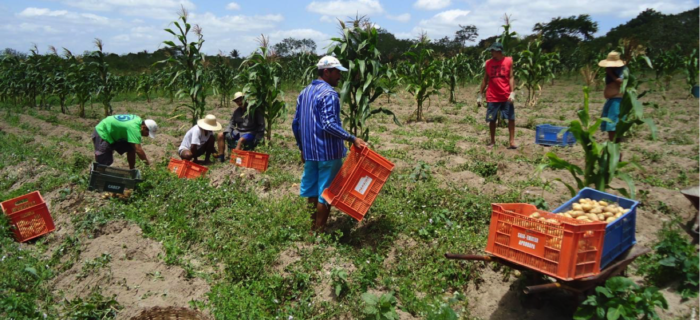Agroecology, Capitalism, and Climate Change
Click here to view this blog in Spanish. Photo by Paul Peterson. This article was originally published in Spanish here.
Greenhouse gas concentrations have reached levels never before detected. As a result, temperatures in the oceans and the earth are ~ 1 ° C higher than in the pre-industrial era, and precipitation has become more variable and more extreme. These changes already exert tangible impacts on several planetary biophysical processes (acidification of the oceans, extinction of thousands of species, shortage of fresh water, etc.). They also jeopardize agricultural production, especially the large industrial monocultures — which are part of the problem, but continue to expand despite its self-destroying tendencies by undermining the ecological conditions of production. Industrial monocultures produce 30% of greenhouse gases, and given their genetic homegeneity, they are extremely vulnerable to climate change.
Although there is awareness of the emergency that climate change represents, carbon emissions continue to increase, and there are no signs of actions which could curb global warming. The problem is that the root cause of the ecological challenge is that the capitalist system is unable to ensure respect for the environment by implementing urgent cuts in carbon emissions, because these measures threaten its very existence. Stopping emissions before reaching the 2 ° C threshold (which would lead to a state of climatic irreversibility) requires a revolutionary change that goes against economic growth and the hegemony of multinational corporations. To stay below the threshold, rich countries would have to cut their emissions by 10% per year, threatening the levels of consumption and welfare they enjoy and that they don’t want to abandon. The necessary agricultural changes would require not only breaking the monoculture with agroecological strategies, but also dismantling the control of the multinationals over the food system, the oil-based production system, and the neoliberal agrarian policies that protect it.
The answer to climate change from corporate interests is that technology linked to the magic of the market can solve climate problems, promoting the illusion of an unlimited economic growth that does not impact nature. Agribusiness takes advantage of the climate crisis to “re-structure” with the same conventional strategies but disguised under the name of “climate-smart agriculture.” The proposed practices prioritize mitigation based on carbon markets over socio-ecological resilience and food sovereignty. Carbon credits favor the most polluting farmers, and farmers who practice carbon sequestration sell their credits to multinational polluters who need to greenwash ther image.
Agroecology promotes the transformation of production systems, and the creation of alternative networks of healthy and accessible food for all people. Agroecology capitalizes on the experience of thousands of peasants who use polycultures and agroforestry systems that minimize risks in the face of climate change. Evidence shows that these agroecological systems are more resistant to the impacts of droughts and hurricanes than monocultures, therefore they constitute models that thrive without agroechemicals and thus offer a range of management designs to reinforce the resilience of modern agroecosystems.
Agroecology proposes a radically different vision to globalized food systems based on homogenization, specialization, industrialization, and short-term economic gains. The new agroecological systems are based on family systems of small scale, local, biodiverse, autonomous farming sytems, embedded in territories controlled by communities and supported by solidarious consumers who understand that eating is both a political and ecological act.


 Help Food First to continue growing an informed, transformative, and flourishing food movement.
Help Food First to continue growing an informed, transformative, and flourishing food movement.




